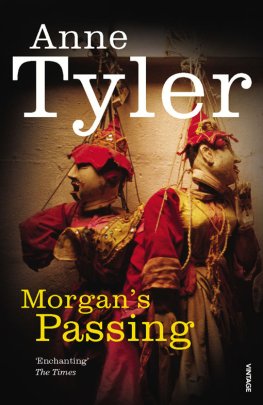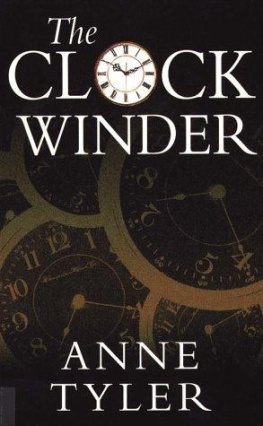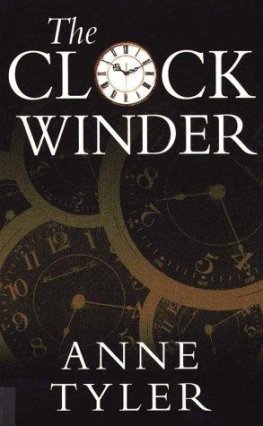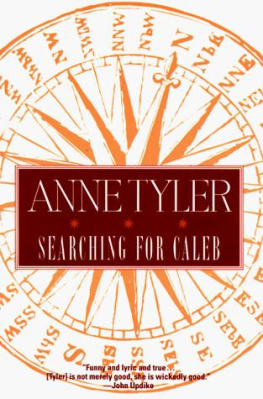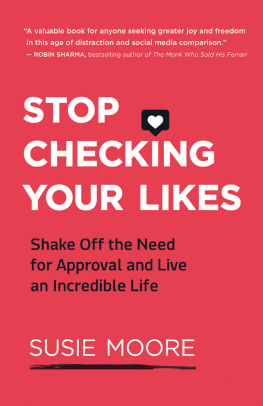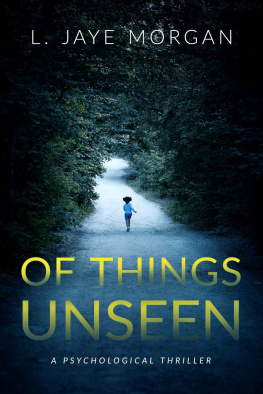Anne Tyler - Morgan's Passing
Here you can read online Anne Tyler - Morgan's Passing full text of the book (entire story) in english for free. Download pdf and epub, get meaning, cover and reviews about this ebook. year: 1987, publisher: Vintage, genre: Prose. Description of the work, (preface) as well as reviews are available. Best literature library LitArk.com created for fans of good reading and offers a wide selection of genres:
Romance novel
Science fiction
Adventure
Detective
Science
History
Home and family
Prose
Art
Politics
Computer
Non-fiction
Religion
Business
Children
Humor
Choose a favorite category and find really read worthwhile books. Enjoy immersion in the world of imagination, feel the emotions of the characters or learn something new for yourself, make an fascinating discovery.
- Book:Morgan's Passing
- Author:
- Publisher:Vintage
- Genre:
- Year:1987
- Rating:5 / 5
- Favourites:Add to favourites
- Your mark:
- 100
- 1
- 2
- 3
- 4
- 5
Morgan's Passing: summary, description and annotation
We offer to read an annotation, description, summary or preface (depends on what the author of the book "Morgan's Passing" wrote himself). If you haven't found the necessary information about the book — write in the comments, we will try to find it.
Morgan's Passing — read online for free the complete book (whole text) full work
Below is the text of the book, divided by pages. System saving the place of the last page read, allows you to conveniently read the book "Morgan's Passing" online for free, without having to search again every time where you left off. Put a bookmark, and you can go to the page where you finished reading at any time.
Font size:
Interval:
Bookmark:
Anne Tyler
Morgan's Passing
There used to be an Easter Fair at the Presbyterian church every year. Early Saturday morning the long, gentle hill out front would be taken over by tents, painted booths, mechanical rides on lease from the Happy Days Amusement Company, and large wooden carts slowly filling up their windows with buttered popcorn. A white rabbit, six feet tall, would bow in a dignified way as he passed out jellybeans from a basket. In the afternoon there would be an egg hunt behind the Sunday School building, and the winner was given a chocolate chicken. Music floated everywhere, strung-out wisps of one song weaving into another. The air always smelled like cotton candy.
But the Baltimore climate was unpredictable. Sometimes it was really too cold for a fair. One year, when Easter fell in March, so little was growing yet that the egg hunt was a joke. The eggs lay exposed and foolish on the bald brown lawn, and children pounced on them with mittened hands. The grownups stood hunched in sweaters and scarves. They seemed to have strayed in from the wrong season. It would have been a better fair with no human beings at all-just the striped tents flapping their spring-colored scallops, the carousel playing "After the Ball," and the plaster horses prancing around riderless.
At the puppet show, in a green and white tent lit by a chilly greenish glow, Cinderella wore a strapless evening gown that made her audience shiver. She was a glove puppet with a large, round head and braids of yellow yarn. At the moment she was dancing with the Prince, who had a Dutch Boy haircut. They held each other so fondly, it was hard to remember they were really just two hands clasping each other. "You have a beautiful palace," she told him. "The floors are like mirrors! I wonder who scrubs them?' Her voice was wry and throaty, not at all puppet-like. You almost expected to see the vapor rising from her painted mouth.
The Prince said, "I have no idea, Miss what was that name?" Instead of answering, she looked down at her feet. The pause grew too long. The children shifted in their folding chairs. It became apparent that the ballroom was not a ballroom at all, but a gigantic cardboard carton with the front cut away and a gauze curtain at the rear. A child in the audience said, "I have to go to the bathroom,"
"Ssh."
"Your name," said the Prince.
Why didn't she speak?
Really, the children saw, she was only a puppet. They sat back. Something had snapped. Even the parents looked, confused.
Then Cinderella flopped onto her face in a very unnatural way, and a human hand emerged from her skirts and withdrew behind the scrim. The children stared. On the stage lay her dead and empty shell, with her arms flung back as if broken. "Is it over?" a child asked his mother.
"Hush. Sit still. You know that's not how it ends."
"Well, where's the rest, then? Can we go?"
"Wait. Here comes someone." It was a grownup, but just barely. He felt his way through the bedsheet that hung at one side of the stage: a dark, thin boy in khakis and a rust-colored corduroy jacket, with a white shirt so old and well washed that all the life had gone out of it. There was something fierce about him-maybe the twist of his mouth, or the defiant way he kept his chin raised. "Ladies and gentlemen," he said, running a hand through his hair. "Boys and girls"
"It's the Prince," said a child.
"Boys and girls, there's been an illness. The play is over. You can get your money at the ticket booth." He turned away, not even waiting to see how this would be taken, and fumbled at the sheet. But then be seemed struck by another thought, and he turned back to the audience. "Excuse me," he said. He ran a hand through his hair again. (No wonder it was so mussed and ropy.) "Is there a doctor in the house?" he asked.
They looked at each other-children, mostly, and most of them under five. Apparently there was no doctor. The boy gave a sudden, sharp sigh and lifted a corner of the sheet. Then someone at the rear of the tent stood up.
"I am a doctor," he said.
He was a lank, tall, bearded man in a shaggy brown suit that might have been cut from blankets, and on his head he wore a red ski cap-the pointy kind, with a pom-pom at the tip. Masses of black curls burst out from under it, His beard was so wild and black and bushy that it was hard to tell how old he was. Maybe forty? Forty-five? At any rate, older than you'd expect to see at a puppet show, and no child sat next to him to explain his being there. But he craned his head forward, smiling kindly, leading with his long, pinched nose and waiting to hear how he could help. The boy looked relieved; his face lost some of its tension.
'Come with me," he said. He lifted the sheet higher.
Stumbling over people's feet, sliding past the children who were already swarming toward the exit, the doctor made his way to the boy. He wiped his palms on his thighs and stooped under the sheet. "What seems to be the trouble here?" he asked.
"It's her," said the boy.
He meant the blond girl resting on a heap of muslin bags. She was small-boned and frail, but enormously pregnant, and she sat cradling her stomach-guarding it, looking up at the doctor out of level gray eyes. Her lips were so colorless, they were almost invisible.
"I see," said the doctor.
He dropped down beside her, hitching up his trousers at the knees, and leaned forward to set a hand on her abdomen. There was a pause. He frowned at the tent wall, weighing something in his mind. "Yes," he said finally. He sat back and studied the girl's face. "How far apart are the pains?" he asked.
"All the time," she said, in Cinderella's wry voice.
"Constantly? When did they begin?"
"About. an hour ago, Leon? When we were setting up for this performance." The doctor raised his eyebrows-two black thickets. "It would be exceedingly strange," be said, "if they were so close together this soon."
"Well, they are," the girl said matter-of-factly.
The doctor stood up, grunting a little, and dusted off his knees. "Oh, well," he said, "just to 'be on the safe side, I suppose you ought to check into the hospital. Where's your car parked?"
"We don't have one," the boy said.
"No car?" The doctor looked around him, as if wondering how all their equipment had arrived-the bulky stage, the heap of little costumes, the liquor carton in the corner with a different puppet's head poking out of each cardboard compartment.
"Mr. Kenny brought us," said the boy, "in his panel truck. He's chairman of the Fund-Raising 'Committee."
"You'd better come with me, then," the doctor said.
"I'll drive you over." He seemed fairly cheerful about it. He said, "What about the puppets? 'Shall we take them along?"
"No," said the boy. "What do I care about the puppets? Let's just get her to the hospital."
"Suit yourself," the doctor told him, but he cast another glance around, as if regretting a lost opportunity, before he bent to help the boy raise the girl to her feet. "What are they made of?" he asked.
"Huh?" said 'the boy. "Oh, just.. things." He handed the girl her purse. "Emily makes them," he added.
"Emily?"
"This is Emily, my wife. I'm Leon Meredith."
"How do you do?" the doctor said.
"They're made of rubber balls," said Emily. Standing, she turned out to be even slighter than she'd first appeared. She walked gracefully, leading the men out through the front of the tent, smiling at the few stray children who remained. Her draggled black skirt hung unevenly around her shins. Her thin white cardigan, dotted with specks of black lint, didn't begin to close over the bulge of her stomach.
"I take an ordinary, dimestore rubber ball," she said, "and cut a neck hole with my knife. Then I cover the ball with a nylon stocking, and I sew on eyes and a nose, paint a mouth, make hair of some kind" Her voice grew strained. The doctor glanced over at her, sharply.
Font size:
Interval:
Bookmark:
Similar books «Morgan's Passing»
Look at similar books to Morgan's Passing. We have selected literature similar in name and meaning in the hope of providing readers with more options to find new, interesting, not yet read works.
Discussion, reviews of the book Morgan's Passing and just readers' own opinions. Leave your comments, write what you think about the work, its meaning or the main characters. Specify what exactly you liked and what you didn't like, and why you think so.

